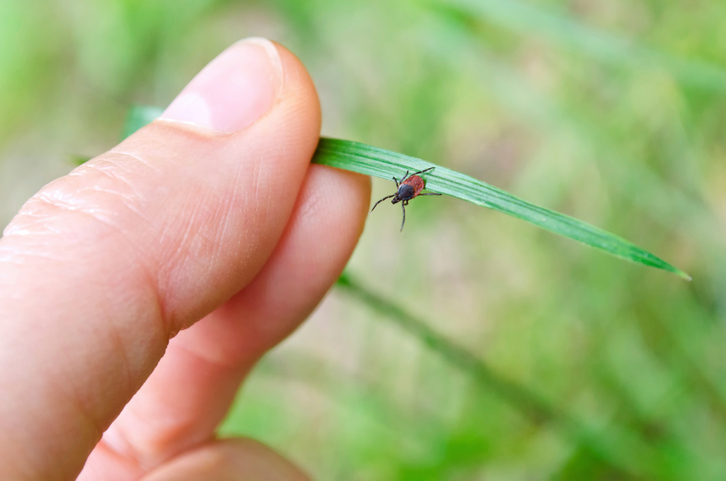Tick season – Protect yourself

Posted on June 7, 2017
You may have heard the recent reports about the high number of ticks this season. No matter the reason for the increase, we know we have to protect ourselves and reduce our risk of exposure to ticks. Not all ticks carry disease-causing germs, but many do and can cause serious illness when they bite you, including Lyme disease, babesiosis and anaplasmosis, among others.
Take precautions
Deer ticks and dog ticks are very common in Massachusetts, Connecticut and throughout New England. They can be found in tall grasses, wooded areas, leaf piles, anywhere that is damp, and even in your backyard.
You don’t have to stop going outside, but it is important to take some precautions when you do go out. Here are some tips for avoiding getting a tick bite:
- Wear protective clothing that covers your skin. Light colors are best so you can spot ticks easily.
- Use a tick-repellant spray on your shoes and clothes.
- Do a check of your clothes and brush off before going inside.
- Check yourself and your loved ones daily head to toe, especially after coming indoors. Learn how to do a Tick Check.
- Check your pets for ticks too.
- Keep your yard mowed and remove leaf piles.
- Trim shrubbery and low branches around your property.
- Don’t invite wildlife into your yard. Keep birdfeeders and wood piles away from areas you frequent. And, keep fences and sheds clear of leaves and brush, which are havens for tick-carrying mice and small rodents.
If you find a tick
If you find a tick crawling on you or on a loved one or if a tick has attached itself, remove it immediately using fine-point tweezers. For tips on removing a tick, visit the Centers for Disease Control and Prevention tick removal webpage at https://www.cdc.gov/ticks/removing_a_tick.html.
Put the tick in a plastic freezer bag and freeze it. This way, if symptoms develop, you can bring the tick with you to your primary care provider (PCP) and have it identified and tested.
Symptoms to watch for
If you develop any of the following symptoms after you have been exposed to or bitten by a tick, call your PCP right away. Treatment is available for tick-borne diseases. It is important that treatment be started early.
Early Lyme disease has symptoms that usually occur between 3 and 30 days after a tick bite.
- If you have been infected with Lyme disease, you may get an expanding rash that looks like a bull’s eye, but this is not always the case.
- You may also experience flu-like symptoms such as fever, fatigue or aching muscles.
- If Lyme disease is not treated early, it may develop into more serious joint, heart or neurological problems.
Symptoms of babesiosis usually begin to appear from 1 to 8 weeks after being bitten by an infected tick and can last for up to several months. Symptoms may include:
- Fever, chills, headache
- Achy joints and muscles, fatigue
- Nausea, vomiting, abdominal pain and dark urine
Symptoms of anaplasmosis, also known as human granulocytic anaplasmosis (HGA), usually begin to appear 7 to 14 days after being bitten by an infected tick.
- Symptoms include fever, chills, muscle ache and fatigue, and headache that often doesn’t get better with over-the-counter medicine.
- Less commonly, people may have abdominal pain, nausea, vomiting, diarrhea, cough and joint aches.
- If HGA is not treated early with antibiotics, it may cause serious or potentially life-threatening complications.
For more about Lyme disease, visit:
http://www.mass.gov/eohhs/gov/departments/dph/programs/id/epidemiology/ticks/public-health-cdc-tickborne-lyme-faq.html
For more about babesiosis, visit:
http://www.mass.gov/eohhs/docs/dph/cdc/factsheets/a-c/babesiosis.pdf
For more about anaplasmosis, visit:
http://www.mass.gov/eohhs/docs/dph/cdc/factsheets/a-c/anaplasmosis-hga.pdf?_sm_au_=iVVMHZQDkNhZ04rM
Source: www.mass.gov
Other resources
- Massachusetts Health and Human Services – Overview about ticks and tick-borne diseases: http://www.mass.gov/eohhs/gov/departments/dph/programs/id/epidemiology/ticks/
- TickReport – Tick testing available by the University of Massachusetts – Amherst, Laboratory of Medical Zoology: https://www.tickreport.com/
- TickEncounter Resource Center – Information about ticks provided by the University of Rhode Island: http://www.tickencounter.org/
Comments are currently closed.








